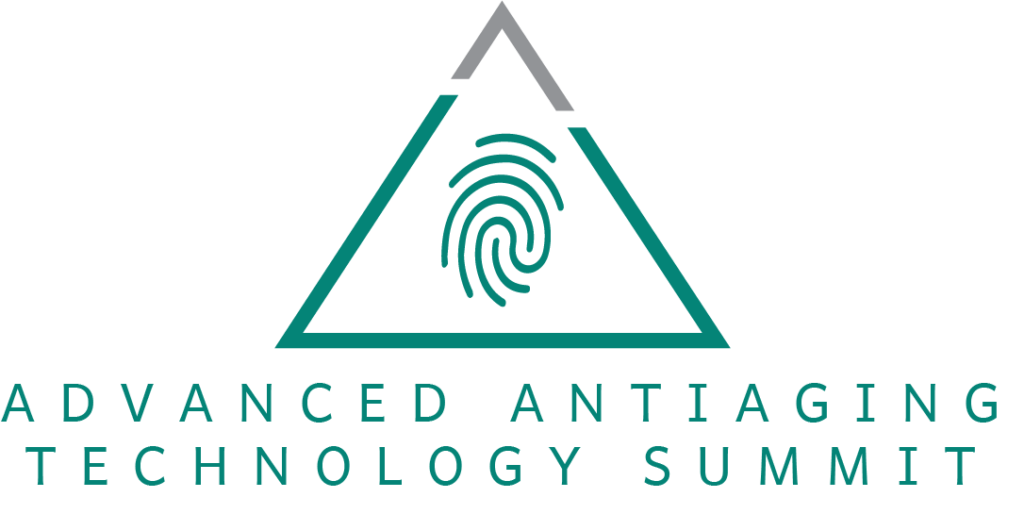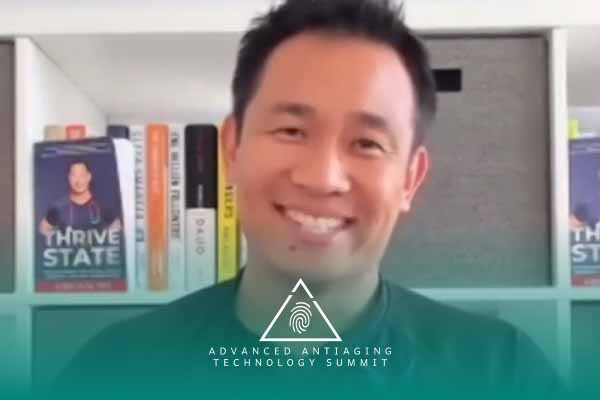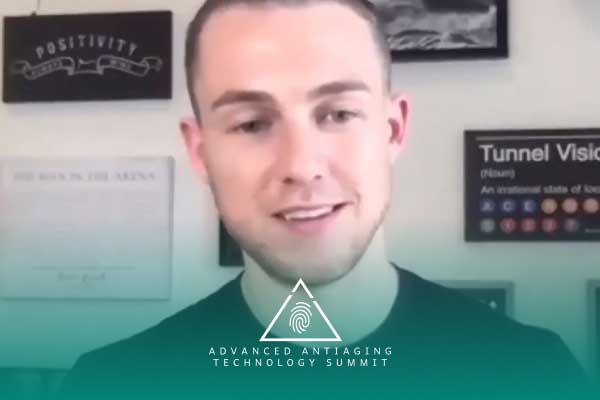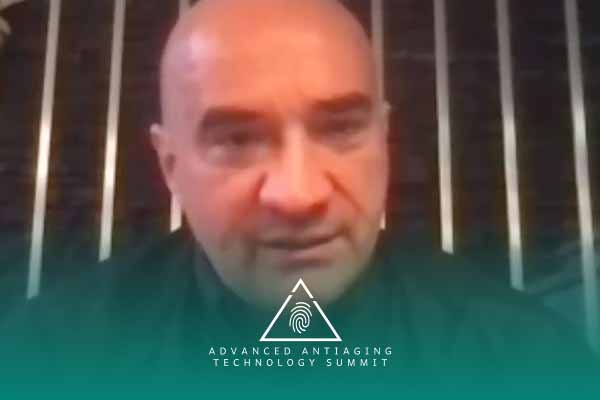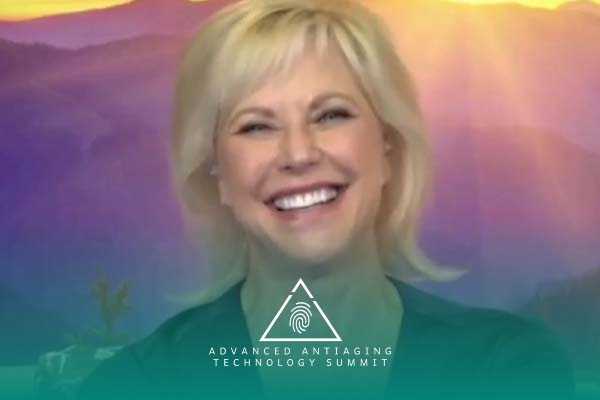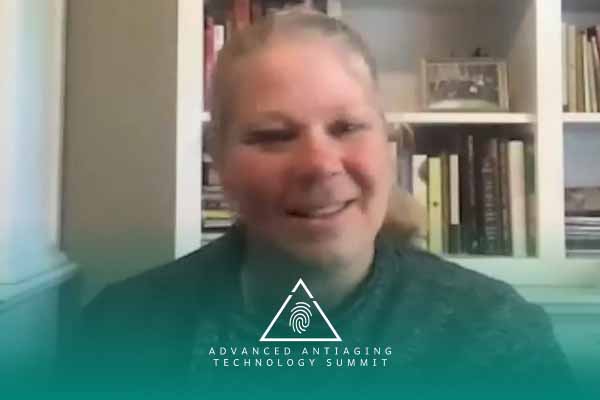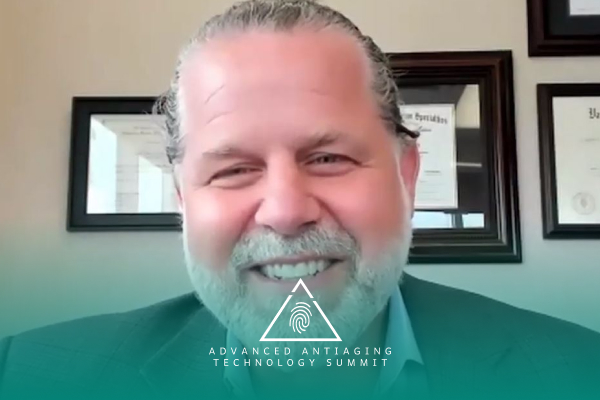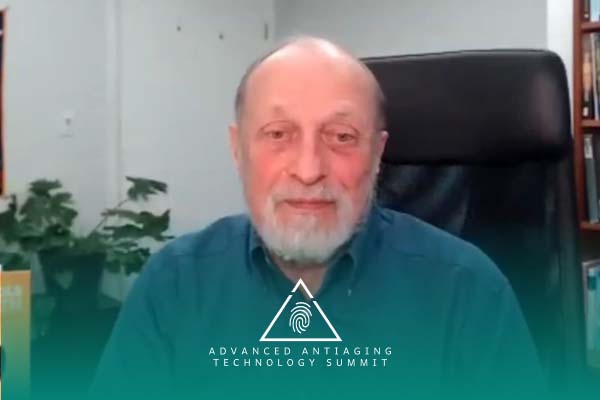Join the discussion below
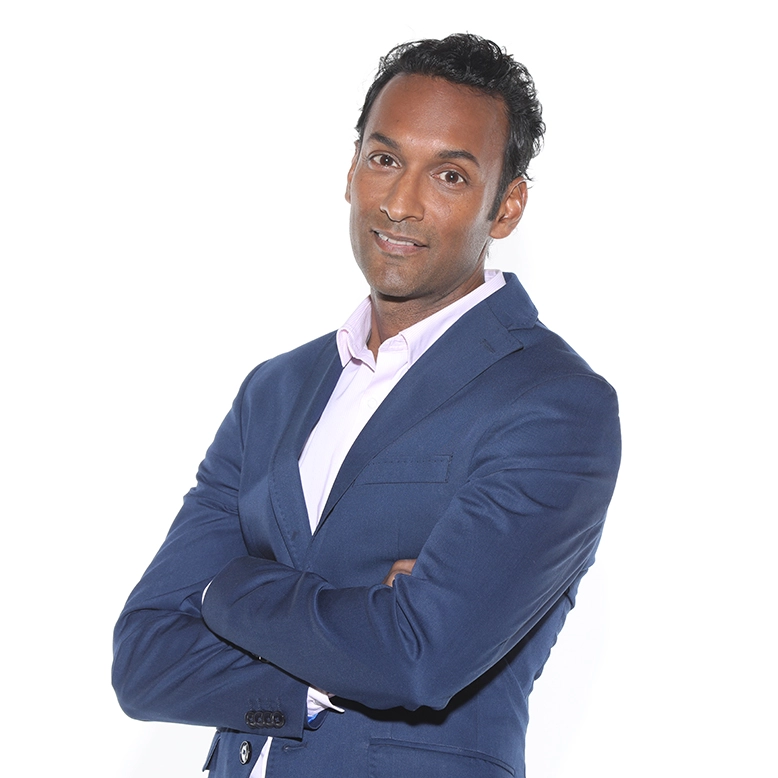
Dr. Goel is a medical physician and founder of Peak Human Labs. His mission is to speak knowledge of the latest cutting edge medical tools and science in order more people to live in a Peak mental, physical and spiritual state. You can learn more about his work at longevity.peakhuman.ca. Read More
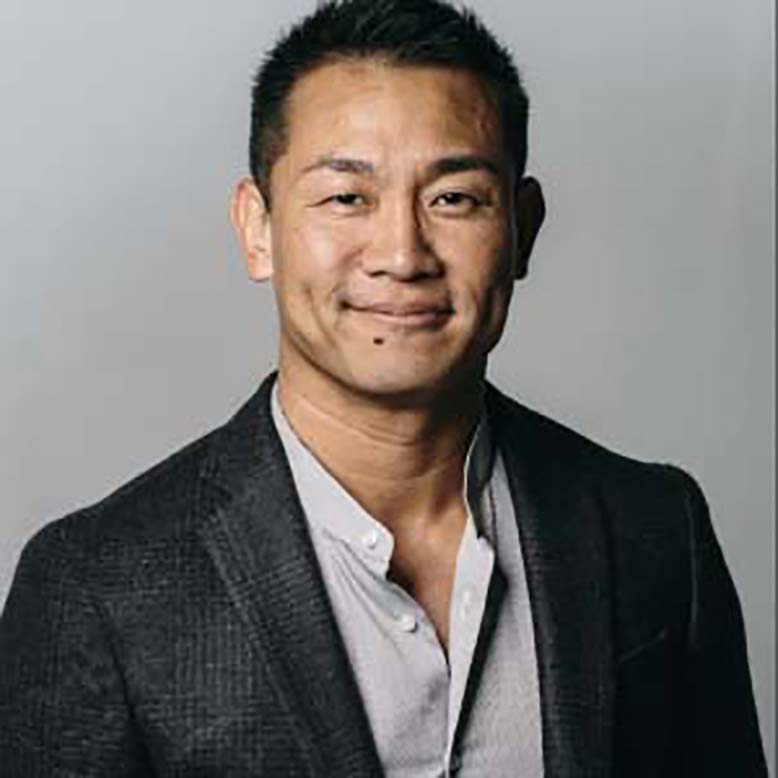
Dr. Kien Vuu is one of the most sought-after anti-aging physicians in the country. At his VuuMD Longevity and Performance Clinic, Dr. Vuu regularly works with celebrities, top corporate executives, and high-functioning professionals to optimize their health, performance, and vitality. He’s also a health media personality, appearing on national TV... Read More
Sanjeev Goel, MD, FCFP (PC), CAFCI
Hi everyone. I’m Dr. Sanjeev Goel. And today we have Dr. Kien Vuu for the advanced anti-aging and technology summit. Welcome Dr. Vuu how are you?
Kien Vuu, M.D.
It’s been it’s… I’m doing really, really good. And it’s really nice to see a familiar face. And we were just chatting right now knowing that the first time we met we’re just two guys in this, in this health conference but the only two guys working out and making longevity count.
Sanjeev Goel, MD, FCFP (PC), CAFCI
Yeah that’s it. And we didn’t say anything in the gym till later on but we would check each other out. See who’s doing what. So maybe before we get started I wanted our listeners to understand who you are your background. So I’m just gonna read your bio. So just bear with me with that. So let’s start Dr. Kien Vuu is one of the most sought after anti-aging physicians in the country. At his Vuu MD Longevity and Performance clinic, Dr. Vuu regularly works with celebrities, top to corporate executives, and high functioning professionals to optimize their health performance, and vitality. He’s also a health media personality appearing on national TV shows such as The Doctors, and Access Hollywood and helped to train the next generation of physicians as assistant professor of health sciences at UCLA. As someone who has overcome two chronic diseases himself, Dr. Vuu is passionate about empowering people to reclaim their health and live with fulfillment, abundance, and purpose. You’re welcome. So I want to start right off there. You mentioned this, you had these two chronic diseases so maybe that’s the perfect segue into how did you get into this field of work? And I assume it’s because of your background.
Kien Vuu, M.D.
Yeah, definitely. So just to start off, you know I am a conventionally trained medical doctor and the specialty I was in was actually Interventional Radiology. And for people in the audience who don’t know what that is, well radiology is medical imaging. It’s, piercing inside the body with CT scans, ultrasounds X-rays, to really diagnose basically all diseases and what they look like anatomically inside your body. What is an Interventional Radiologist? Well, an Interventional Radiologist and somebody that uses that imaging to do minimally invasive surgeries. So, in essence, I was a minimally invasive surgeon that uses all these sophisticated medical technology to do surgeries on people with end stage cancer, diabetes, heart disease. So I’ve really become the gamut of being able to treat late stage chronic disease.
Well, five years ago I thought I’ve really achieved my pinnacle in life. I was the chief of Interventional Radiology at my hospital. I was traveling around the world talking about all these sophisticated techniques and technologies to treat chronic disease. But underneath my white coat, I was overweight, I was diabetic. I was hypertensive and I was on prescription medications. So I was this doctor that was treating… that had early stage disease of the diseases I was treating. And I said to myself there’s something off. I am becoming a statistic of, you know, what I’m helping others, you know… What I’m helping other people get over. And that just wasn’t right. And it was really at that point… And actually it was a lot of things that happened within that year. You know when I was diabetic, overweight and hypertensive.
I also needed shoulder surgery so I wasn’t sure if I was able to do Interventional Radiology anymore. I had a close uncle pass away from cancer. I had a woman I thought I was gonna marry and because I was so you know, set in trying to succeed in my career that I didn’t pay any attention to her. And she left me for another man. So all these things happened. It was really kind of like, you know, on the outside achieving all this external success, but on the inside not feeling very fulfilled and that not feeling fulfilled actually led to all the habits that gave me those chronic diseases. And it was really at that point that I started to, okay, highlight, how do I get myself outta this?
Sanjeev Goel, MD, FCFP (PC), CAFCI
I just remember in medical school, everybody want to be an Interventional Radiologist, but you were obviously at the pinnacle pinnacle of what everybody wants to be when they’re graduating from med school. It was the the hardest thing to get into. So you had this kind of, like a bunch of things that happened in your life and you, What was the aha moment? I guess it was just a number of things that just kind of said, okay this, I need to look at things differently? Or what was it some particular event?
Kien Vuu, M.D.
Yeah so
Kien Vuu, M.D.
It was those things I was just talking about Needing surgery for my shoulder. Not sure if I could operate anymore, Two, woman leaves me. Three, I’ve got this chronic disease. So I remember actually rounding my at my hospital and I picked up the chart for the next patient. It was actually a 43 year old man with terminal pancreatic cancer. And the request said drain 10 liters of fluid from his belly. And in my mind, I’m thinking, all right, you know what? I’ve got a bad year, but this guy’s got it really bad. And I expected to walk into a room with somebody who was just really frail and sick. And I said, I better… I better , you know not come in with poor energy but I opened the door and here’s this guy, his name is Ishmael.
I remember his name. He looks me in the eye with bright eyes. He said “Hey doc, how you doing man?” And I was just taken so aback, like how is this guy, you know, approaching life with such zest and love, you know with not having much time left. And so I asked him a question “Ishmael how are you so positive now?” And he said, doc, it didn’t always used to be this way. I used to be a very angry person. I used to indulge in feelings of anger and resentment a lot. But you know, this disease has really woke me up and you know, I can always show up, at this point now I could always choose how I show up in the world.
I can’t choose what this disease is gonna do but I can still choose how I decide to show up. And I decide to show up with love. And I decide to show up, you know with positivity and man, that did a number on me because at that point I said, I have a choice. I said, right now I’ve got chronic disease and yes I am a doc, but maybe I could look in maybe I could defeat this. And that started me off the journey of one, doing the lifestyle things I needed to do to reverse my disease and then going really, really deep into anti-aging, regenerative medicine, epigenetics and a lot of emotional and spiritual healing as well.
Sanjeev Goel, MD, FCFP (PC), CAFCI
Mm hmm And I understand that you, so you have this thrive model of how to thrive in the world or in your life.
Sanjeev Goel, MD, FCFP (PC), CAFCI
Yeah So maybe you want to talk about that and the model that you’re using the bioenergetic model, that would be great. Maybe just tell our listeners how you approach it.
Kien Vuu, M.D.
Yeah well I mean, so as I was starting to heal myself you know, the physical parts, you know getting good, getting better sleep because we as medical students, well, first of all I need to say this, you know what? We go into medical school. We never really learned how to be healthy. And in fact, the culture of medicine. And I’m not quite sure if it was the same in Canada as it is in the states, but you know the 80 to 100 hour work weeks. And I almost had to lie during residency to say that I’ve worked under that. You know, not having access to good food, but when I started to change diet, you know started to move more and started to sleep better. I started to notice quick shifts happen very, very quickly.
But there were some even deeper deeper things that I needed to shift. And I started to understand once I started to go into the realm of epigenetics, what some of those thoughts and feelings and the spiritual energies that actually affect actually how our cells behave. So I have to take us back to my very early journey. You know of how I got disease. I got disease, not only because, you know I didn’t focus on my sleep nutrition and exercise, but it was this feeling of not being enough and so many of my clients right now, you know the Dalai Lama has a quote. He says, what do you found most interesting about humanity? He says, man, because he would sacrifice his health in order to make money and then sacrifice his money to recuperate his health. And where was I? So I was born in Vietnam shortly after the Vietnam war.
I spent eight months on a refugee boat. I was the only infant to survive. I spent another three months in the Philippine refugee camp and then a Catholic church sponsored us to America. And one would think that a child going through that experience and being the only child to survive would feel very very grateful growing up. But that wasn’t the case. You know, I grew up and I looked in the media and I was actually bused to a more affluent area for school. I was constantly being made fun of for being Asian for being immigrants, you know for the holes in my hand-me-down clothes, for the stinky food my mom had me go to school with, and there was a lot of feeling of just not being enough. I didn’t know. I didn’t feel worthy in my own skin. And I always felt at that point that I needed something outside of myself, you know to make myself feel better inside. And it was always that chasing.
So when it came to medical school, I chased Interventional Radiology because it was the hardest sexiest thing to go into. And I used that mask of the white coat to cover up that not enoughness I had inside. So, I mean, yes, I had my dream house at the time. Yes. I had the car of my dreams. You know, I had all these external things, but deep inside I still didn’t feel that within myself. And what does that do inside our body? That feeling of not being enough those feelings of unworthiness? Well, that makes us seek these external things. And if we can’t feel that within ourselves our body goes into the stress state. And what happens in the stress state, inflammation goes up our immunity goes down our propensity to get chronic disease happens, and then just because we don’t feel good we pick up habits that are not healthy for us as well. And that puts us prone to get chronic disease.
So, once I started to understand that part of my healing and I went really really deep into what performance really was, I worked very closely with an epigeneticist at UCLA. His name was Steven Cole, and we went through , and basically how do our cells actually behave? What is performance? What is longevity? Well, it’s really up to our individual cells. When our individual cells are functioning at its optimal state. You and I have peak immunity, we have peak performance. We have longevity, all our functional works great. If our cells are at a sub-optimal state, here’s the thing, our cells need, you know what? Our heart cells need our lung cells to extract as much oxygen from the air as possible. Our brain cells needs that heart cell to pump as efficiently as possible to get that blood up to the brain.
But if you start to have sub-optimal functioning cells, that’s when you have… Puts us prone to get disease, because you know, sub-optimal cells lead to sub-optimal tissues sub-optimal tissues lead to sub-optimal systems. And let’s say you have a sub-optimal cardiovascular system. That’s when you have atherosclerosis, heart attack, stroke sub-optimal immune puts us prone to autoimmune disease and cancer. Sub-optimal nervous system puts us at risk of Dementia of Alzheimer’s disease. So what then determines whether or not our cells are optimal or not? Back in the day, people thought, Hey, it was actually our genes. It’s whether or not mom and dad had these genes that passed onto you, you know and that would actually determine whether you have disease or not.
The fact of that is actually not true. It’s not that. Our DNA is actually on a moment to moment basis constantly listening to all the different energies and signals coming from the environment. Every single signal actually comes down to the DNA and it’s transmuted into growth factors, hormones, cytokines, that actually switches on and off genes in our DNA. And it’s actually that energetic environment that actually determines whether our cells are in what I call the thrive state or whether our cells are in the stress state. And after working with that, epigeneticist Steven Cole. We’ve come up with seven main things seven things that you and I can do on a moment to moment basis without any medications that will actually put us in a state of thriving.
And what are those seven? Those are sleep, nutrition, movement, or exercise stress and emotional mastery, relationships, thoughts and mindset and purpose. Those are the seven main bioenergetic factors that actually determine whether our cells decide they’re gonna thrive or to enter a stress state. And here’s the thing. When I start working with my clients I work on these seven things first, before I start prescribing them other things, because, you know in the world of anti-aging and regenerative medicine there are, tons of tools that we have in our tool belt. A lot of them being very, very expensive but what I notice is this if we don’t focus on those seven things first, you know a lot of things we give to our patients whether it be our PRP shots or exosomes and all those things, they’re working on a system that might be more prone to inflammation and they’ll actually treat the inflammation and not actually give you what you need. So we need to start really on the background of being an elevated bioenergetic state first.
Sanjeev Goel, MD, FCFP (PC), CAFCI
Hmm. That’s so interesting. Yeah. ‘Cause you’ve mentioned things that are not typical. Like, I mean, apart from nutrition and exercise these other things, which are mind and spirit which I’ve never heard before. I mean, connecting it so clearly. So I’d love you to tell me a little bit more about the, you said impact of emotions. You said thought and mindset, and then you said purpose. So those are the three I caught.
Kien Vuu, M.D.
Yeah. So I’d love to hear more about
Sanjeev Goel, MD, FCFP (PC), CAFCI
Yeah for sure. And then how does it impact…
Kien Vuu, M.D.
So after going deep Yeah. So our physical, mental, emotional and spiritual energies, they’re all connected. And in fact, if one’s off you can work on some of the things on the other end and things will be better. And I’ll give you examples, but let’s dive a little bit deeper into the things that you just talked about. So emotions, and if we take emotions like anger, resentment hate, contempt, all those negative emotions. And I know it well now with all this anti-aging stuff you know that’s going around in the world right now but those negative emotions actually put you in the stress state. So those emotions will actually, you know, turn on stress hormones, such as Cortisol and Norepinephrine. It will actually raise inflammatory markers such as IO1, IO6 and TNF-alpha. All right.
And what does that all do ? That again, raises inflammation, lowers cellular immunity, puts you prone to get chronic disease and not function very well. You know, and poor performance basically whereas emotions like love, like joy, like connection like gratitude, all those are actually anti-aging medicines. So that’s a very beautiful thing to know. If you find yourself caught in some of those emotions, there’s actually some techniques I take my clients through to actually reverse some of that. And that takes us then to our thoughts and our mindset because humans are probably the only species on the planet that could think a negative thought and start to get angry, upset. Right, and turn on those negative emotions. But if we could understand this if we could understand that, you know our thoughts aren’t necessarily ours, who we are, are the observer of our thoughts and who we are, are the focuser of the thoughts that we want to have. So if we start to feel an emotional charge come up.
We can tell ourselves, okay, what am I thinking? Is that that “I’m not enough” thought that’s coming up again or that “I’m an imposter” thought that’s coming up again. And you say, okay, that’s actually not true. That’s something that I picked up. And if you could start to separate and observe your thoughts, there’s this process I take people through. Like if you feel that negative emotional charge, first, take 10 deep breaths in through your nose, out through your mouth. And what that’ll do is it’ll activate your parasympathetic state, turn down your stress response, all right?
Sanjeev Goel, MD, FCFP (PC), CAFCI
Right.
Kien Vuu, M.D.
In that space right there, you activate your vagus nerve. And if you could separate yourself from your thoughts and go, “Oh okay. That’s just that old thing that’s coming up again.” All right. “I don’t have to attach myself from that.” And you’ll start to notice your emotional response to that will dampen, but in that space what you could also do is start to choose, Hey how do I wanna show up? Do I wanna show up with more joy with more love, with more gratitude right now? Ah, yes. And then see if you can get yourself to start feeling it. All right. So choose that. And then finally come out of it that taking new action.
If you wanna show up with more love and gratitude, even though your spouse, your partner is yelling at you, okay. It’s like, Hey this is just an emotional reaction. I wanna show up with love. Maybe I just need to pause and hug right now, taking a new action. And when we can train our brain to do that over and over and over again, which is, short circuit the old programmed negative responses and put in these new more empowering responses from your true choice. That’s when we start developing new thought habits. That will start to transform us on a physiological level as well.
Sanjeev Goel, MD, FCFP (PC), CAFCI
It sounds, I mean, it sounds very like somewhat like I guess, mindfulness meditation or something to I guess bring attention to your thoughts and be an observer. So I’m curious about what do you… How often do you tell your clients or patients to practice this and you know what would, yeah what does that look like? Like in reality, like how often are people doing this? How often should be checking in?
Kien Vuu, M.D.
As often as possible? It’s great to always be mindful but I would have to say that everybody’s technique that they resonate with most is gonna be a little bit different. For some you know, writing things down and journaling things down. Will get it out of your head and just go, “Oh my God I can’t believe I thought that.” Right. So journaling is a great technique. For another person it might be breath work. You know, learning breath work really is a way to kind of you know, tap back into our parasympathetic system tap back into the part that’s truly us and not, you know not the us that’s reacting. And then for other people, it’s, you know, deep medicine like for me, it was doing some plant medicines and exploring some psychedelics. That’ll allow me to take a look at my thoughts as not being real and maybe just things from my past, and allow me to maybe make new choices as we begin to become more mindful. And we start to observe our thoughts from that space.
You know, the Holocaust survivor who’s seen so much death and destruction, but still came out of it with a great sense of worth was a man named Victor Frankl who wrote “A man’s search for meaning.” He has this quote that I use in my book, Thrive State. He says “Between stimulus and response, there’s a space. And in that space is our power to choose a response. And in a response lies our growth and freedom.” So this is how I tell my cl… You know, when I work with my clients, I say, if you’re having that food craving if you’re craving just bingeing on Netflix if you are craving that cigarette or if you’ve got that negative emotional pattern that’s coming up, do that technique where you create space by taking 10 deep breaths.
And that acronym I use for them during that space is ACT which is Awareness, Choice and Take action. And do that throughout the day. If you could just pause a little bit, you won’t be somebody that’s basically, you know somebody that just has a stimulus and reacting to it from an old pattern that you didn’t install, it was TV. It was your parents. Maybe it was other people, that installed these old ways being that are in you. But if you could start to see that… Those old patterns are not you and that you are the observer of those patterns, ah that’s where you become Neo in the matrix.
Sanjeev Goel, MD, FCFP (PC), CAFCI
Yeah. So what do you think, let’s say someone’s doing this for the first time they’re listening to you today. What would be the first thing they could do that you’d kind of tell your clients? Okay the very beginning first step. What is that? Like is it ACT or is it something else?
Kien Vuu, M.D.
Right. Well, when I go meet with a client I do a complete bioenergetic assessment. That’s looking at those seven things that I discussed. And, you know, when somebody reads my book, they’ll see a list of so many different things that they can implement. The easiest, the thing I tell them to work on first is that low hanging fruit. Make that very first thing the easiest thing that you can do the easiest thing, you know, if you can create that activation energy of trying something on that’s new then you happen to make it really, really easy, you’re gonna start to create that energetic momentum. Like just an extra 30 minutes of sleep. If you can do that, it’s gonna start to change up some of your hormones where you’re gonna start to feel better. Well, if you start to feel better, guess what you might go ahead and start exercising.
That’s now gonna add to that. So energetically, these all build on themselves, but one of the very first easy things that I think a lot of people do, which they don’t do is breathe. People forget to breathe. You know, if you can… If you start to ask yourself, “Oh am I really breathing today?” Like breathing, actually breathing through your nose too. Do you know that breathing through your nose increases nitric oxide in your body? And you get so many more cognitive benefits when you breathe through your nose and not your mouth? But those are the tiny things. Breathing is super important. Having awareness is super important and always just picking the easiest things to do first and starting off of them and creating a habit at it.
Sanjeev Goel, MD, FCFP (PC), CAFCI
Mm hmm. And this, you talk about purpose. So maybe just tell us about that. Like how does that relate and what does someone’s purpose look like? What types of purpose are you seeing?
Kien Vuu, M.D.
Great question. So, you know when I started to look at some of the studies on purpose. Did you know that people who have a deep sense of purpose their Telomeres are actually longer and they’re more maintained. And for the people who don’t know Telomeres are these end caps of your DNA that basically protect yourselves from aging. All right. So that’s number one. If we look at Americans, people with a deeper sense of purpose live on average seven years longer than people who do not. If you had a deep sense of purpose, your risk of getting a cardiovascular event is actually lower.
In fact, if you have a deep sense of purpose, if you end up in the hospital, you spend fewer days in the hospital, if you’ve got this deep sense of purpose. So, you know purpose actually is anti-aging medicine. So the next question is, well, how do I find it? Or how do I tap back into it? And in fact, there used to be a time. I, you know, I knew that purpose was really important and I was going through and being very stressed out trying to find out what my purpose is.
When really the answer is quite simple. You know, when we can, if the emotional states that bring us joy, gratitude, love, and connection those positive emotional states, if there’s such anti-aging medicines for us, if we could find the things that we do, the people we hang out with the you know, if we find those activities and things that really light us up, or puts us in those positive emotional states that’s who we are as authentic people. And basically our purpose is just to share us with the world, it’s sharing our gifts with the world It’s sharing, you know, the struggles that we’ve been through that we’ve overcome and helping somebody else with that. Our purpose is really, you know… Your purpose is you. My purpose is me it’s really to share the authentic versions of ourselves, sharing our gifts with the world and when we can do that, You know, this is kind of like our genes gifting us with longevity and peak performance. When we tap into who we really, really are.
Sanjeev Goel, MD, FCFP (PC), CAFCI
So I think that’s very interesting that you said that we… I mean, at the deep root of it everybody has a… It’s a common purpose. Is that not correct? What you’re saying is sharing love with everybody else. That’s pretty much… It’s sharing us, yes. Uhun. That’s the ultimate, that’s the ultimate purpose probably.
Kien Vuu, M.D.
Yeah
Sanjeev Goel, MD, FCFP (PC), CAFCI
I think everything comes down to that.
Kien Vuu, M.D.
Yeah.
Sanjeev Goel, MD, FCFP (PC), CAFCI
That’s very interesting. ‘Cause I know when my throws of experience with plant medicine I was tired of just saying that that that’s what my purpose was. Not a spiritual person. I mean a spiritual person, but not a religious person. And it was surprising that that’s what came out. So I guess that must be the that must be the deep rooted purpose for everyone, that you said the same thing.
Kien Vuu, M.D.
Exactly.
Sanjeev Goel, MD, FCFP (PC), CAFCI
Interesting
Kien Vuu, M.D.
And I really do believe that. I mean, we, you know, we try to… when we try to make something to grandiose, it becomes you know, a far reaching thing, when it’s just, just sharing who you really are and sharing yourself with love to your community. That’s all it is. And that’s a beautiful thing. And, you know, I say these things because when I first started on my, you know my anti-aging longevity journey, like many people I was doing hormone optimization, things like that. And you can keep giving people more nutrients supplements, hormones, and all that type of stuff. If they’re not working on these things that elevate their bioenergetic state first. First of all, if you’ve got a low bioenergetic state your testosterone is gonna be low. You know, your microbiome might be off. All these things are gonna be off.
So you’re gonna have to supplement a lot. But if you recognize, if you could… If you could start off with an elevated bioenergetic state and then go, oh, okay, where are you now? You’ll start to notice that as people elevate their bioenergetic state a lot of what people are supplementing with they don’t have to supplement with as much. So I always start there particularly if you’re using like very expensive treatments like if you were gonna inject a knee or a shoulder with some exosomes or some stem cells or things like that if you’ve got a lot of inflammation if your body’s in this stress and danger state, all that stuff is gonna be used to treat the underlying inflammation that’s going on in your body and not focused on that injury that you want to repair.
Sanjeev Goel, MD, FCFP (PC), CAFCI
So how does the listener know what their bioenergetic state is. Is that just a feeling or is there a way to, you assess that and know what that’s like? Is there some
Eventually objective measurement ?
Kien Vuu, M.D.
I gave a talk recently and I came up with like this child’s toy and I started waving it around in the crowd and I’m like, you know, it’s starting to measure things.
Sanjeev Goel, MD, FCFP (PC), CAFCI
Right.
Kien Vuu, M.D.
And and I was like, you know, wouldn’t it be nice if I could find out how resilient you were, you know if you’re suffering from emotional trauma and all that type of stuff. And I think right now, we’re not quite there yet but we’re getting pretty advanced where, you know, people from AI standpoint can take a look at your facial features to tell you what’s going on bioenergetically inside your body. So there might be a point where we’ll have something like that, but you know, for right now it’s subjective but it’s also objective, right? The objective things that I do do is take a look, you know do a diabetes screen, take a look at your inflammatory markers that are inside your body.
Doing all of those things, and then also how are you feeling? What emotions, where is your emotional home? And it’s taking all those surrogate markers to have a rough idea as to what your bioenergetic state is. But I think there’s technology in the future that’ll be able to measure all these different things. And if you, you know, basically take a compilation of brainwave scans with laboratory values and those things, we’ll have a better idea as to what this bioenergetic state is and more specified in the very, very near future, I think.
Sanjeev Goel, MD, FCFP (PC), CAFCI
Sounds good. For nutrition. Can you tell us, like what’s your kind of recommendation on that? Like what are you advising patients? ‘Cause I mean there’s so much, so much out there
Kien Vuu, M.D.
There’s so much stuff that’s out there. You know, I talk about it in my book and I, what I really do follow is I love Dr. Mark Hyman’s Pegan diet. You know, I think it’s very, very sensible. And what I do is I also add intermittent fasting to that because, you know, so you could take advantage of the autophagy from intermittent fasting but I think intermittent fasting along with the Pegan diet is you know, is very, very simple to follow. And, you know, it’s really gotten me from my diabetic state to where I am now.
Sanjeev Goel, MD, FCFP (PC), CAFCI
That’s awesome.
Kien Vuu, M.D.
and I purposely wore a tight shirt just to show that off. I’m kidding.
Sanjeev Goel, MD, FCFP (PC), CAFCI
So that’s, I guess I can see that you’ve made a lot of… I mean, obviously it doesn’t look like you’re overweight or have diabetes. So how much in your personal life has it changed? Like all this transformation, how much impact did it have on your health? Were you able to reverse the Yeah diabetes?
Kien Vuu, M.D.
Well so the diabetes was reversed in four to six months just with the physical stuff. But once I start to really be more mindful as to where my emotions are, you know, ask myself, “Okay where are these negative thoughts? And can I start to shift and transform them?” Then I started to feel like I got more life back into me you know, so physically I was feeling better but emotionally, mentally, it started to feel like I was a new version of myself. This is why I’m so passionate to do what I do because I really feel like now I’m this superhero version of myself doing what I’m meant to do out in the world. And if we could have, you know, the world basically be full of superheroes and like the entire world is just like Justice league or the Avengers sharing their gifts, we would have a different humanity. And I’m really excited. You know, about that outlook.
Sanjeev Goel, MD, FCFP (PC), CAFCI
Yeah you have me, you have me as the first person to go down the road with you. I’d be so excited. What do you say to the person who just hearing this, is like a little bit on the fence and like maybe need a little bit help to get motivated on what the possibilities are of going down the road of the you know, the thrive state. What would you tell them?
Kien Vuu, M.D.
Yeah, I would probably ask them, you know, right now, if they were to close their eyes and they saw at their end of their life and if they could see their loved ones talk about them. If they talk about, you know, the community talk about them and you know, what would they have wanted to get done? And where they are right now in their life are they headed towards that direction where they feel like they’ve lived a life full of zest that they are marching towards that direction? And at the answer is no to that, then you have to say yes to some kind of change. And that’s really it, it’s if you’re on the fence just ask yourself, “Am I where I wanna be right now?” ‘Cause change could happen very, very fast and finding the right mentors and finding the right people in your corner can make you change just like that.
And sometimes that change isn’t really big. Sometimes it’s just a millimeter shift, just to be able to see, okay. You know, the reality that you’re swimming in with a lot of stress is just in your head. If you could just step just off of that. “Oh, that’s not really me.” That’s a huge shift. So if you’re not happy with where you’re at right now you’re feeling like, oh, you know what? Like, no, life’s okay. You know, it’s not great. That’s not how it should be. I mean, we are so fortunate to be blessed to be on this earth. And if we’re not, if we’re not really enjoying life and really having those emotions of love, gratitude and the community that, that supports us being the best version of ourselves. I think we’re really, you know Missing the mark there. So if you’re feeling like you’re just a little bit off, start to seek some help, listen to the rest of the speakers in this summit and take action is the next thing. Just take a new action.
Sanjeev Goel, MD, FCFP (PC), CAFCI
Thank you. Where should they go for more information and to get your book?
Kien Vuu, M.D.
You can get my book at thrivestatebook.com. I also have a podcast called The Thrive State podcast. You can find all that information at kienvuu.com.
Sanjeev Goel, MD, FCFP (PC), CAFCI
Awesome. Thank you so much. It was such a great pleasure speaking to you. Thanks so much, Kien.
Kien Vuu, M.D.
Thanks Sanjeev.
Sanjeev Goel, MD, FCFP (PC), CAFCI
All right. Take care.
Downloads
